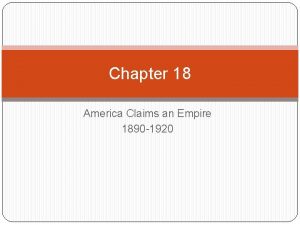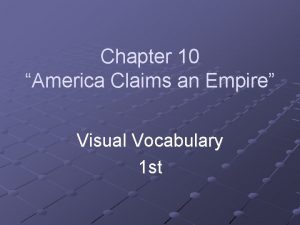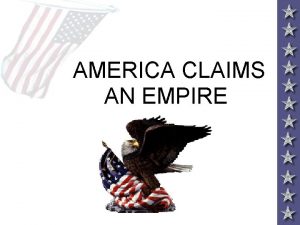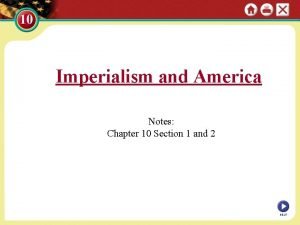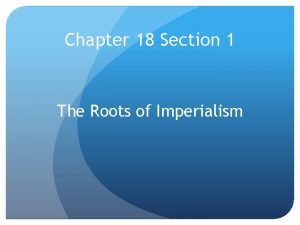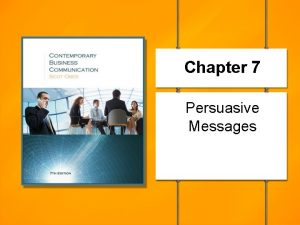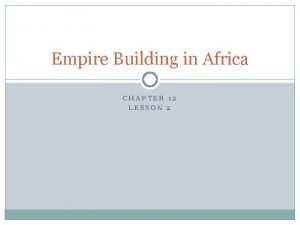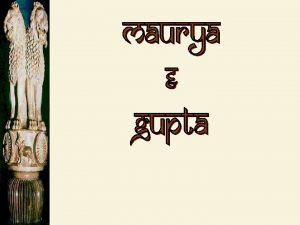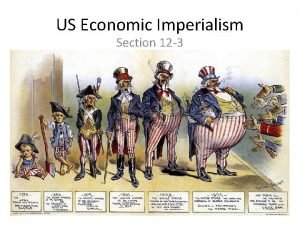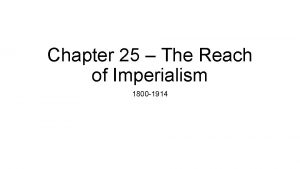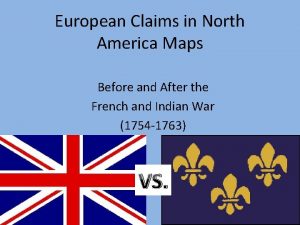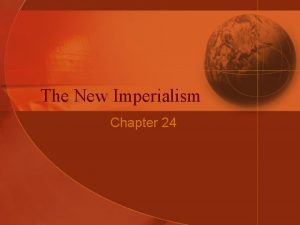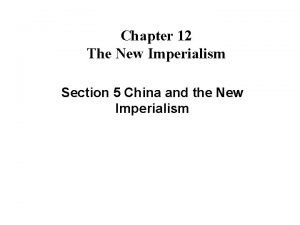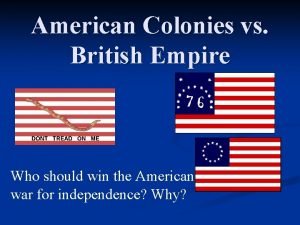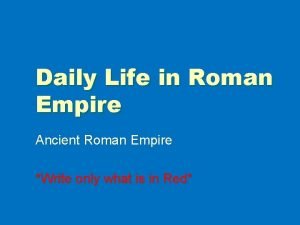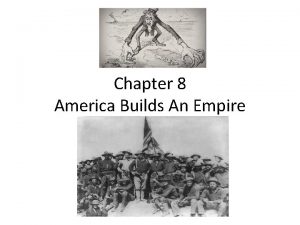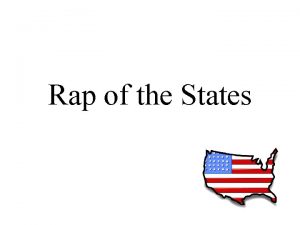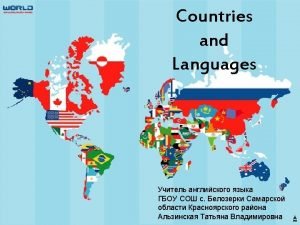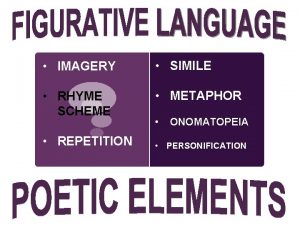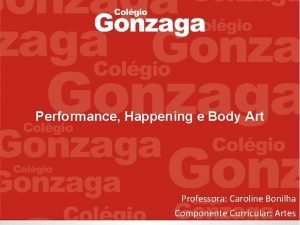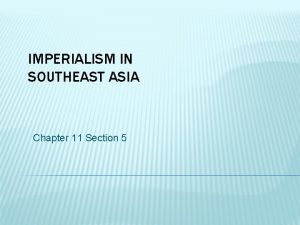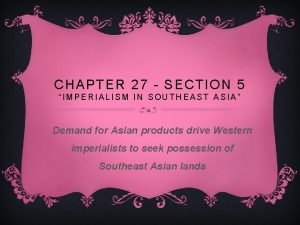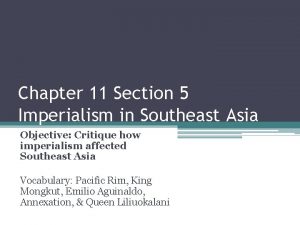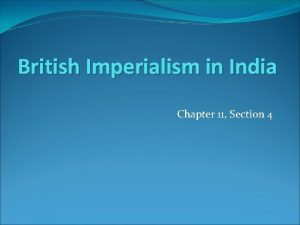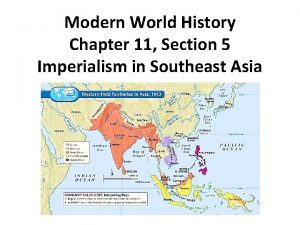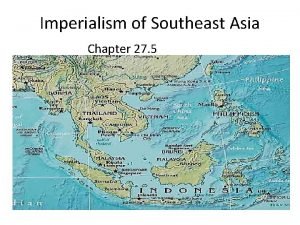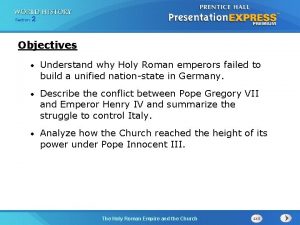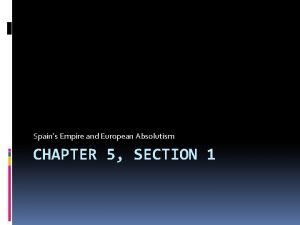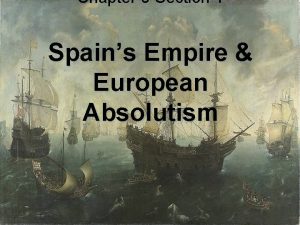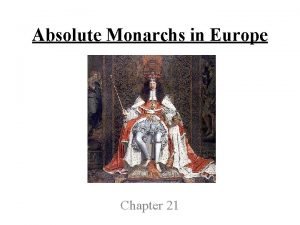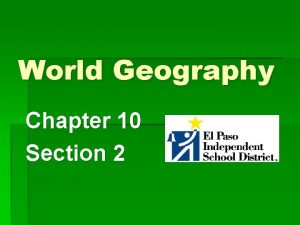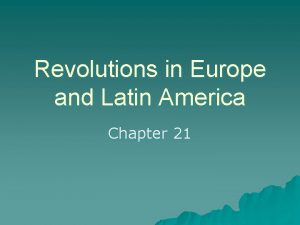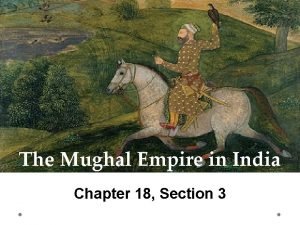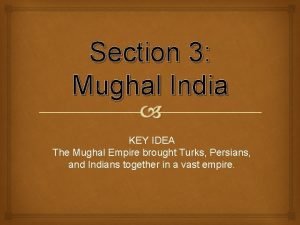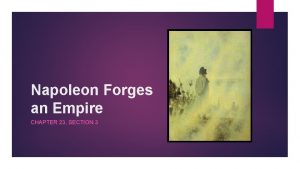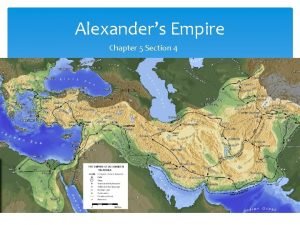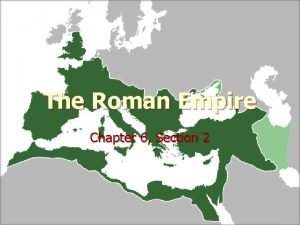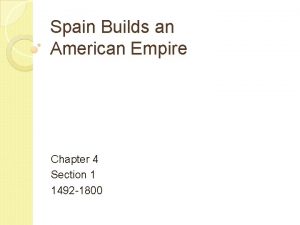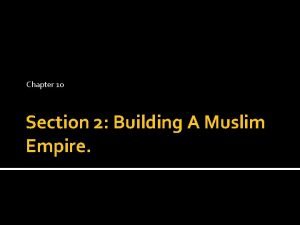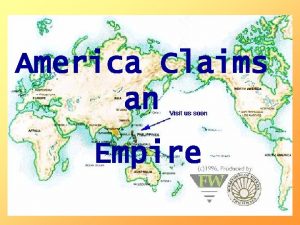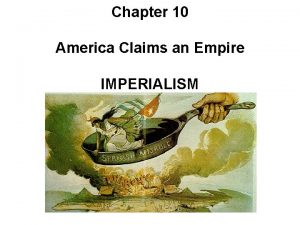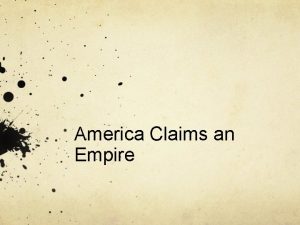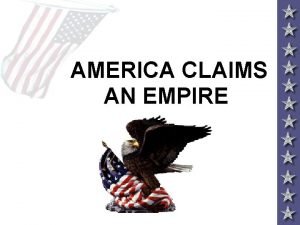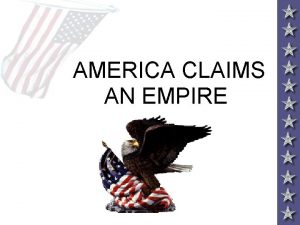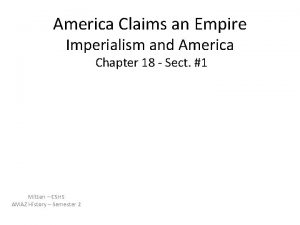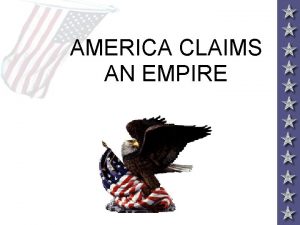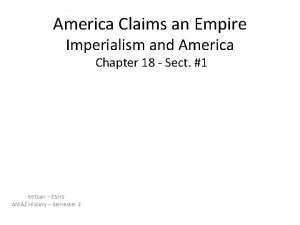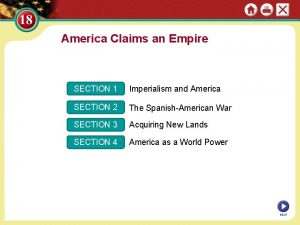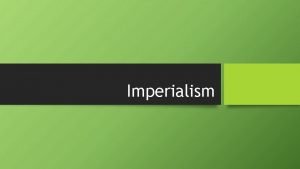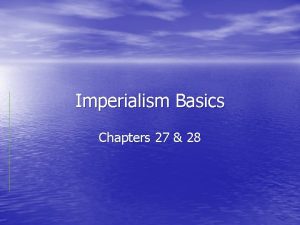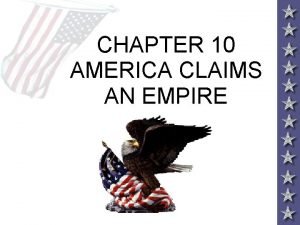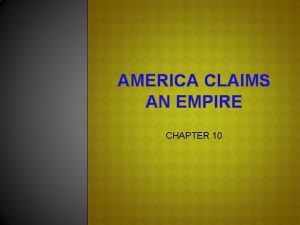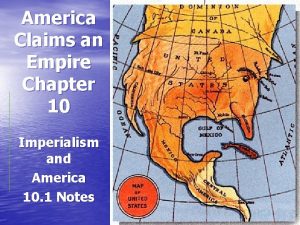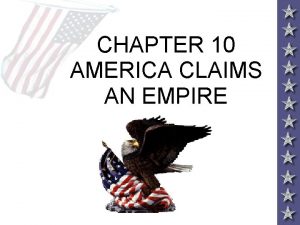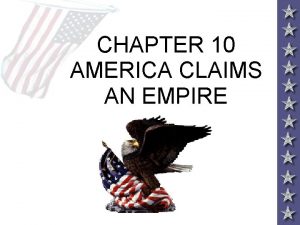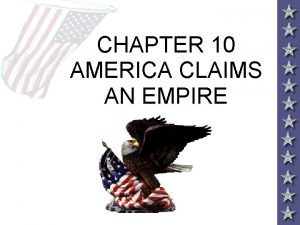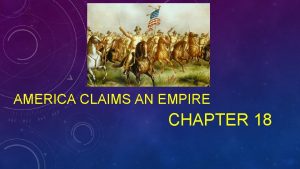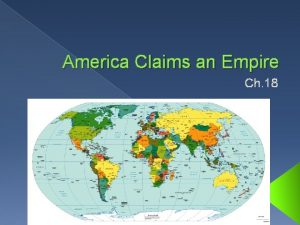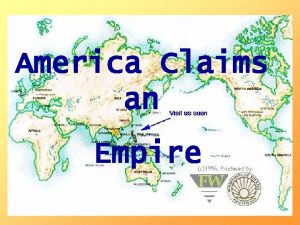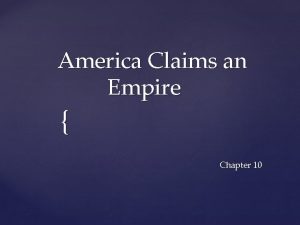America Claims an Empire SECTION 1 IMPERIALISM AND













































- Slides: 45

America Claims an Empire

SECTION 1: IMPERIALISM AND AMERICA Imperialism: the policy in which stronger nations extend their economic, political, or military control over weaker territories. By the 1880 s, many American leaders believed that the US should join the imperialist powers of Europe and establish colonies overseas.

Reasons for American Imperialism Desire for military strength… Alfred T. Mahan: admiral who pushed for a build up in American naval power. Powerful navy to protect shipping lanes Strategically located bases for ships to refuel Mahan argued for the Panama Canal and the acquisition of Hawaii Mahan laid out is plan in The Influence of Sea Power Upon History.

Reasons for American Imperialism Thirst for new markets… Economic competition among industrial nations Belief in cultural superiority White man’s burden Social Darwinism Religion Spread democracy

The U. S. Takes Hawaii Pearl Harbor – Hawaii’s best port. – The US pressures Hawaii and build a naval base there in 1887 – Business groups organized a revolution against the monarchy and set up their own government.

The US Takes Hawaii Sanford B. Dole – Headed the government of Hawaii after the overthrow of Queen Liliuokalani. – Liliuokalani surrendered to the U. S. to prevent bloodshed. – Hawaii is annexed by the U. S. Aug 12, 1898 US overthrows Hawaii's Government - You. Tube

SECTION 2: THE SPANISH-AMERICAN WAR Cubans Rebel Against Spain – By the end of the 19 th century, Spain had lost most of its colonies. Only Guam, Cuba, the Philippines, and Puerto Rico remained. Jose Marti – Cuban poet and journalist who launched a revolution in 1895 against Spanish rule.

What were three reasons for American Imperialism?

War Fever Escalates 1896: – Spain responded to the Cuban revolt by sending troops. – Used concentration camps to control the populace of western and central Cuba.

War Fever Escalates Yellow Journalism – Exaggerating news to lure and enrage readers. – Used by William Randolph Hearst and Joseph Pulitzer. – Exaggerated/false accounts of the war led to American outrage. – Hearst: “You furnish the pictures and I’ll furnish the war. ”

War Fever Escalates President Mc. Kinley preferred to use diplomacy to resolve the crisis. De Lome Letter – Letter written by the Spanish minister to the US to Spain. – Criticized President Mc. Kinley and called him “weak” and “a bidder for the admiration of the crowd. ” – Americans are insulted, Mckinley is not.

War Fever Escalates USS Maine – Warship sent to Cuba to bring home American citizens in danger from the fighting. – Blew up in the harbor of Havana February 15, 1898.

Who or What Sank the Maine?

Your Task With a partner, examine the documents and evaluate investigations into the Maine disaster and answer the provided questions As you read the documents, keep in mind the following: Who wrote or spoke the material? Under what circumstances did he or she do so? What qualifications did that person have for making a judgment? What information did the person have about the situation? What bias might the person have about the situation? What stake might the person have in the outcome of the investigation? What previous knowledge can you bring to your reading?


Questions • Who or what do you think sank the Maine? • Why do you think the first court of inquiry decided as it did (fourth source)? Do you think political pressures were involved in their decision? • Why do you think Admiral Rickover decided to launch a new investigation almost 100 years after the sinking of the battleship? • What are some of the risks of making military decisions too quickly? • Do you think Rickover’s conclusion was based primarily on new evidence or on a new perspective. Explain your reasons.

Mc. Kinley’s Dilemma • Most American business interests opposed intervention • Personally, Mc. Kinley opposed war. • Congress wanted war • If congress declared war without the President’s approval, his administration would be discredited. • Mc. Kinley reluctantly asks Congress for the authority to use the armed forces to help Cuba win its freedom

War with Spain Erupts Philippines – George Dewey leads an American fleet to the Philippines and attacks and destroys every Spanish ship there. – Spain loses 381 men, the U. S. loses one – to heat stroke. Caribbean – U. S. blockades Cuba, and ill-prepared U. S. forces land in Cuba.

America mobilizes for war At the time war was declared, the army had only 28, 000 men 200, 000 volunteer to go to war In May 1898 an expeditionary force gathered at Tampa, FL. The potential invasion force was grossly mismanaged. • not enough ships • entire units without weapons or uniforms • petty rivalries among commanders

Rough Riders The Rough Riders and two African American regiments assault a hill near the city of Santiago on July 1, 1898. This cleared the way for an assault on strategically important San Juan Hill.

Treaty of Paris Treaty that ended the “splendid little war” and forced Spain to free Cuba and turn over the islands of Guam and Puerto Rico to the U. S. The U. S. also annexes the Philippines to “educate…uplift and Christianize” them according to Pres. Mc. Kinley. Winner NHD 2011 "From Isolation to Empire: The Aftermath of the Spanish American War" - You. Tube

Bell Work What did the United States gain from its war with Spain?

SECTION 3: AQUIRING NEW LANDS Puerto Rico – During the war was occupied by General Nelson A. Miles. – Used “heavy-handed” tactics to rule. Foraker Act (1900) – Gave the president of the U. S. the power to appoint Puerto Rico’s governor and members of the upper house of its legislature. – Puerto Ricans could elect only the members of the legislature’s lower house. – Constitution did not apply to territories.

Cuba Teller Amendment (part of 1898 Treaty of Paris) – Stated that the U. S. had no intention of taking over any part of Cuba. – However, Cuba remained occupied by the U. S. military for four years after the war.

Cuba Writes a Constitution In 1900 the newly formed Cuban gov’t writes a constitution that does not specify the relationship between Cuba and the U. S. The U. S. insists that Cuba add several provisions to their constitution. These were known as the Platt Amendment

Platt Amendment – Cuba could not make treaties that limit its independence or permit a foreign power to control any part of its territory. – The U. S. reserved the right to intervene in Cuba. – Cuba was not to go into debt.

Platt Amendment The U. S. could buy or lease land on the island for naval stations and refueling stations. - U. S. made it clear that its army would not withdraw until Cuba adopted the Platt Amendment. Cuba became a U. S. protectorate.

Philippines Emilio Aguinaldo – Rebel leader. – Believed that the U. S. had promised independence after the Spanish-American War.

Philippine-American War Filipinos rebel in 1899, led by Aguinaldo. U. S. exerts its control. Forces Filipinos to live in designated zones. Lasted for 3 years. Costs: – 20, 000 Filipinos died. – 4, 000 Americans died. – Cost to the U. S. : $400 million.

China John Hay’s Open Door Notes – Letters to leaders of imperialist nations proposing that the nations share their trading rights with the U. S. creating an “open door. ” – Meant that no single nation would have a monopoly on trade with any part of China.

Boxer Rebellion in China Boxers – Named by Westerners because they practiced martial arts. – Wanted to rid China of “foreign devils. ” – Attacked missionaries, Chinese converts to Christianity, and other foreigners.

Boxer Rebellion in China August 1900 – U. S. joins an international force to put down the rebellion. – Took 2 months. John Hay issues a second set of Open Door Notes – Stated that the U. S. would safeguard China for open trade with the rest of the world. History Chinas Boxer Rebellion -Documentary You. Tube

Create an imperialism comic strip Use your knowledge of American Imperialism to create a four panel comic strip. Your comic strip must include: Color Some depiction of American imperialism involving Cuba, Puerto Rico, Guam, Hawaii, the Philippines, China, or any combination of the above Dialogue is not required




Bell Work What caused the Boxer Rebellion?

How are the concepts of Manifest Destiny and the Monroe Doctrine apparent in America’s quest for th empire during the late 19 and early 20 th century?

Imperialism review Imperialism: the policy in which stronger nations extend their economic, political, or military control over weaker territories. Justifications: Desire for military strength Thirst for new markets Cultural superiority White Man’s burden Social Darwinism Religion Spread democracy

In pairs, analyze the remaining documents using the template provided as a guide. When analyzing the documents, bullet points will suffice. Also, provide as much info as possible under each category of the APPARTS form. As you are working with the documents, consider how they support/refute the statement at the top of page 1.

SECTION 4: AMERICA AS A WORLD POWER Panama Canal An artificial waterway cut through Panama to provide a shortcut between the Atlantic and Pacific oceans. Investors in the project organized a rebellion to create Panama which the U. S. supported. Opened in 1914. Clip from "Panama Canal" You. Tube

Theodore Roosevelt Corollary – Added to the Monroe Doctrine. – Said that the U. S. would use force to protect its economic interests in Latin America. – Also referred to as “policing. ” – “Speak softly and carry a big stick. ” Dollar Diplomacy – The U. S. policy of using the nation’s economic power to exert influence over other countries.

Woodrow Wilson Gave the Monroe Doctrine a moral tone with “missionary diplomacy. ” Stated that the U. S. had a moral responsibility to deny recognition to any Latin American government it viewed as oppressive, undemocratic, or hostile to U. S. interests. Meant to pressure countries (in W. Hemisphere) to establish democratic governments.

Rebellion in Mexico U. S. invades Mexico to topple Huerta’s government. Carranza becomes President and is recognized by U. S. Francisco “Pancho” Villa – Rebel leader in Mexico who opposed Mexican government.

Rebellion in Mexico Villa eventually turns on the U. S. to end their intervention in Mexico. John J. Pershing – General who led an expeditionary force into Mexico to capture Villa. – Never captures Villa and is withdrawn to Europe to fight WWI…
 Chapter 18 america claims an empire
Chapter 18 america claims an empire Chapter 10 america claims an empire vocabulary
Chapter 10 america claims an empire vocabulary Chapter 18 building vocabulary america claims an empire
Chapter 18 building vocabulary america claims an empire Chapter 10 america claims an empire vocabulary
Chapter 10 america claims an empire vocabulary Chapter 18 america claims an empire
Chapter 18 america claims an empire Chapter 10 section 1 imperialism and america
Chapter 10 section 1 imperialism and america Imperialism and america chapter 18 section 1
Imperialism and america chapter 18 section 1 Old vs new imperialism chart
Old vs new imperialism chart Old imperialism vs new imperialism
Old imperialism vs new imperialism You should not open a persuasive request with a question.
You should not open a persuasive request with a question. Empire building in africa summary
Empire building in africa summary Venn diagram of mauryan and gupta empires
Venn diagram of mauryan and gupta empires South american map
South american map Chapter 25 the reach of imperialism
Chapter 25 the reach of imperialism European claims in north america map
European claims in north america map Chapter 24 section 5 china and the new imperialism
Chapter 24 section 5 china and the new imperialism Chapter 12 section 5 china and the new imperialism
Chapter 12 section 5 china and the new imperialism American empire vs british empire
American empire vs british empire Rich and poor romans
Rich and poor romans Chapter 8 american imperialism vocabulary
Chapter 8 american imperialism vocabulary Rap of the map of the us
Rap of the map of the us North america south america asia europe africa
North america south america asia europe africa Repetition in let america be america again
Repetition in let america be america again Why called latin america
Why called latin america Eu amo a américa e a américa me ama
Eu amo a américa e a américa me ama Chapter 27 section 5 imperialism in southeast asia
Chapter 27 section 5 imperialism in southeast asia Chapter 11 section 5 imperialism in southeast asia
Chapter 11 section 5 imperialism in southeast asia Imperialism in southeast asia chapter 27 section 5
Imperialism in southeast asia chapter 27 section 5 British imperialism in india chapter 11 section 4
British imperialism in india chapter 11 section 4 Chapter 11 section 5 imperialism in southeast asia
Chapter 11 section 5 imperialism in southeast asia Chapter 27 section 5 imperialism in southeast asia
Chapter 27 section 5 imperialism in southeast asia The holy roman empire and the church section 2
The holy roman empire and the church section 2 The holy roman empire and the church section 2
The holy roman empire and the church section 2 Chapter 5 section 1 spain's empire and european absolutism
Chapter 5 section 1 spain's empire and european absolutism Chapter 5 section 1 spain's empire and european absolutism
Chapter 5 section 1 spain's empire and european absolutism Spain's empire and european absolutism chapter 21 section 1
Spain's empire and european absolutism chapter 21 section 1 Chapter 10 section 2 central america and the caribbean
Chapter 10 section 2 central america and the caribbean Revolutions in europe and latin america section 1 quiz
Revolutions in europe and latin america section 1 quiz Chapter 18 section 3 the mughal empire in india
Chapter 18 section 3 the mughal empire in india The mughal empire in india chapter 18 section 3
The mughal empire in india chapter 18 section 3 Napoleon forges an empire chapter 23 section 3
Napoleon forges an empire chapter 23 section 3 Chapter 5 section 4 alexander's empire
Chapter 5 section 4 alexander's empire Chapter 6 section 2 the roads of the roman empire
Chapter 6 section 2 the roads of the roman empire Spain builds an american empire chapter 20 section 1
Spain builds an american empire chapter 20 section 1 How did napoleon restore ord
How did napoleon restore ord Contlater
Contlater
